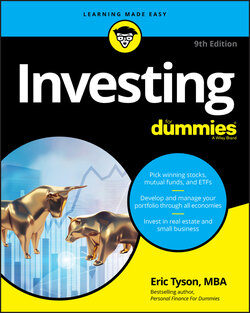Читать книгу Investing For Dummies - Eric Tyson - Страница 60
Determining your investment tastes
ОглавлениеMany good investing choices exist: You can invest in real estate, the stock market, mutual funds, exchange-traded funds, or your own or someone else’s small business. Or you can pay down mortgage debt more quickly. What makes sense for you depends on your goals as well as your personal preferences. If you detest risk-taking and volatile investments, paying down your mortgage, as recommended earlier in this chapter, may make better sense than investing in the stock market.
To determine your general investment tastes, think about how you would deal with an investment that plunges 20 percent, 40 percent, or more in a few years or less. Some aggressive investments can fall fast. (See Chapter 2 for examples.) You shouldn’t go into the stock market, real estate, or small-business investment arena if such a drop is likely to cause you to sell low or make you a miserable, anxious wreck. If you haven’t tried riskier investments yet, you may want to experiment a bit to see how you feel with your money invested in them.
A simple way to mask the risk of volatile investments is to diversify your portfolio — that is, to put your money into different investments. For that to work for you, you need to examine your portfolio’s total value over time and not be distressed when particular investments are lower. Not watching prices too closely helps, too — that’s one of the reasons real estate investors are less likely to bail out when the property market declines. Stock market investors, unfortunately, can get daily and even minute-by-minute price updates. Add that fact to the quick phone call or click of your computer mouse that it takes to dump a stock in a flash, and you have all the ingredients for short-sighted investing — and potential financial disaster.
